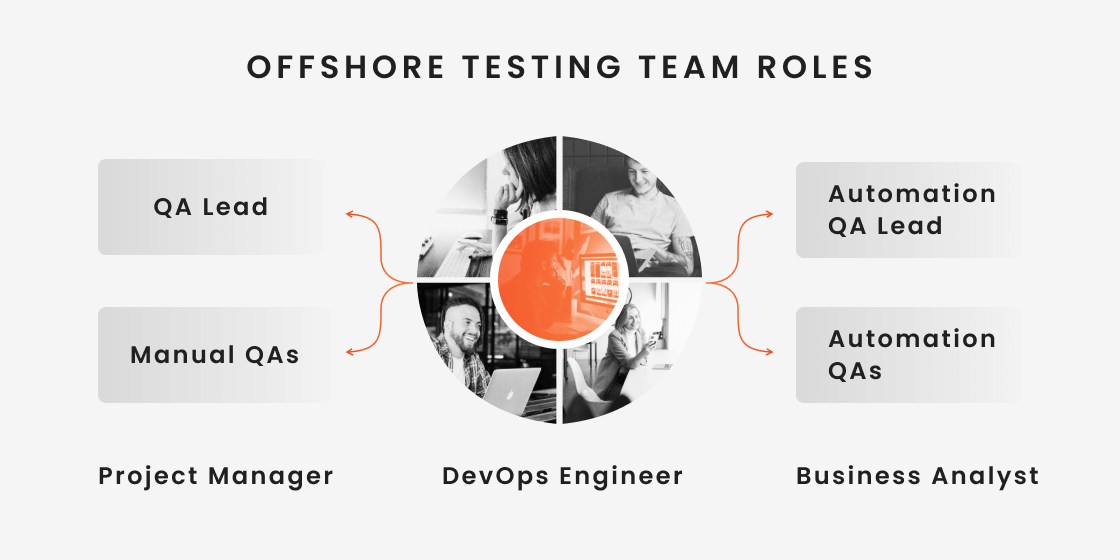How the Cost of Offshore Testing Is Formed: All the Factors That Matter
The cost of offshore software testing services is never fixed simply because of how many different factors need to be taken into account. At the same time, these factors are not something you will find listed in your bill. If you want to better understand how the cost of offshore software QA is calculated, here are the key factors that impact the final price:
- Geographic location. Depending on where offshore QA teams are located, the cost of their services can vary greatly. For example, Asian and Eastern European offshore companies are known to be very affordable, while Western European teams charge more.
- Project complexity and duration. Highly complex tasks, such as large-scale performance or security testing, costs more than basic QA tasks. Long-term cooperation also requires a bigger budget compared to a one-month simple QA project.
- Team composition and skill level. The most affordable QA specialists are usually Junior to Middle QAs with a general skill set. The more experienced specialists your project requires, and the more specific expertise you need, the more you should be prepared to pay.
- Tools and technologies used. On some projects, the team can make do with open-source testing tools and technologies at no additional cost for the client. However, that is not often the case, and licensed tools can further increase the project budget.
- Security requirements. Additional data protection and security requirements, especially in industries like fintech and healthcare, can impact the cost of the project, especially if the team needs to use paid security tools in their work.
- Client’s management team involvement. Depending on the engagement model and agreement between the client and the vendor, the offshore QA team can work almost completely autonomously. Still, heavy involvement on the client team’s side is bound to increase the cost of testing.
- QA standards and certifications. When you are determined to hire a team with specific QA certifications like CMMI or ISO, you should be prepared to increase your spending accordingly.
How to Make the Most of Your Offshore Testing Team
When you hire an offshore testing team, the choice of a vendor and the composition of the team are obviously important, as is the scope of work you plan to hand over to the new team. However, when using offshore software testing services, the work doesn’t stop there, as the team also needs to be continuously and effectively managed to keep the quality of your software product at a desired level. Here are some tips for efficiently managing your offshore partners.
1. Get to Know Your QA Team Members
Starting with the correct spelling and pronunciation of your colleagues’ names, try to better know them and make them know each other in order to strengthen your personal and professional bonds you need while working together. It’s a good idea to ask your offshore testing team members to make simple one-sliders about themselves including a photo and some basic information. In case you have both an in-house and an offshore QA team, establishing a good rapport should be one of your main priorities. An experienced and highly motivated project manager can successfully cope with this task.
2. Be a Strong Communicator & Handle the Language Barrier
In the absolute majority of cases, offshore QA team members have a good enough grasp of English to handle both technical documentation and everyday communication. But that doesn’t mean your project is immune from possible communication issues. When you are working with people located offshore, communication skills gain an even more important value. Regular team calls and text communication, along with the occasional informal conversation or team building event, can solve many of the communication problems that can take place with an offshore software testing company.
3. Arrange a Realistic Onshore-Offshore Balance
If your company delivers both development and testing services and has offshore offices, it’s tempting to assign the whole testing part to an offshore team. But this is a trap you don’t want to get in. Rather than thinking of the offshore percent of the workflow you’d like to reach in the project to reduce your target cost, look at what you are really able to entrust to offshore QA expertise, considering such issues as the complexity of your business processes, accessibility constraints of the testing systems, etc.
That way, both the in-house and the offshore teams will have a crystal clear understanding of their duties, and you will be able to assign different tasks to the most capable team members depending on their specialty.
4. Adapt Your Issue Management Process
Most projects use management tools for documenting and tracking defects since these can be operated from either onshore or offshore locations. However, many projects miss out on issue management for resolving some functional, technical and business related queries an offshore quality assurance team might face during test phases. That’s why you should make sure your offshore team uses some web-powered document management system properly. You also need to be aware of time zone differences: with proper management, even a 13-hour difference can turn into an advantage, as a significant time difference allows you to set up a nearly non-stop testing operation with maximum productivity and efficiency.
5. Manage the Documentation on Your Deliverables Properly
Work out a set of guidelines on documentation management covering test scenarios, test scripts, test execution and results documentation. Choose the right test management tool for your company’s needs bearing in mind their effectiveness and accessibility across different locations. It’s also important to begin the documentation process right from the start of the project or even before it is launched. As a result, all the parties involved in the testing project will be able to quickly refer to the documentation in case there are any misunderstandings.
How to Measure the Effectiveness of Offshore Software Testing
By now, you know all the reasons why companies all over the world are going for offshore testing. But in the end, is it worth it? There are several ways to know if your offshore testing collaboration is going well, and these are the most important ones:
- Adherence to deadlines and test coverage. The team will need to evaluate whether different stages of the project were completed on time and whether each phase produced the required amount of test coverage.
- Cost-effectiveness. Here, you’ll need to compare the cost of testing against the previously determined budget to make sure the actual expenses don’t exceed it, given that cost savings are among the most popular reasons to go for offshore QA in the first place.
- Efficient communication. Your job here is to determine how quickly and effectively the offshore team was able to get involved with your day-to-day operations and whether the speed and efficiency of their contributions have had a positive impact on the development process overall.
- Automation and innovation. Automation continues playing an increasingly vital role in software testing, and the more tests the offshore team has been able to automate, thus reducing the dependence on time-consuming and resource-intensive manual testing, the more innovation they have been able to contribute.
- Adherence to testing processes and standards. As a stakeholder in an offshore testing project, you are the one calling the shots when it comes to the testing methodology, process, standards, technologies used, and project management: as long as the offshore team adheres to those requirements, the project can be classified as a success.
- Customer and stakeholder satisfaction. Here, you’ll need to gather and analyze the feedback from the end-users regarding the finished version of your product. Interviewing the project stakeholders, including developers, project managers, and product owners, can also tell you whether the project was successful.
- Software testing KPIs. There are dozens of KPIs used to measure the effectiveness of software testing, and naturally, many of them are also applicable to offshore testing. Most importantly, they include Defect Detection Rate, Defect Leakage, Defect Fix Rate, Test Coverage, Test Automation Coverage, Cost per Defect, On-Time Delivery Rate, Time to Defect Resolution, Defect Reporting Accuracy, Post-Release Defects, Regression Testing Efficiency, and Automation ROI.
Onsite-Offshore Software Testing Services: Are They Worth It?
While many companies around the world work exclusively offshore development and testing teams, there is an increasing number of companies that now use the combination of onsite and offshore testing. Onsite & offshore QA testing services definitely seem like an attractive idea on paper. Let’s look at this model and its pros and cons in more detail.
What Is Onsite & Offshore QA Testing?
The onsite and offshore software QA model is a hybrid delivery approach that takes the best from the two models and combines them into a new winning solution. Under this model, the entire job of testing a software product will be distributed between the onsite and the offshore team. There can be more than one offshore team working on the same project, and they are not necessarily going to be from different countries — although, more often than not, the term “offshore” means “overseas” in this context.
How Onsite and Offshore QA Works
The overall composition and setup of a team on an onsite & offshore software testing project can depend on many factors, including the skill sets possessed by each team member and the specifics of the project. The client will also make the decision based on the business interests — e.g. how much of the work makes financial sense to entrust to an offshore team.










